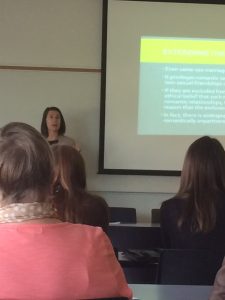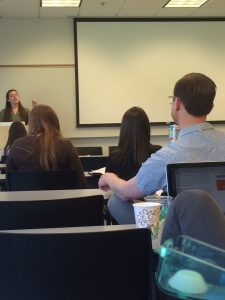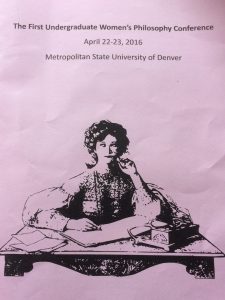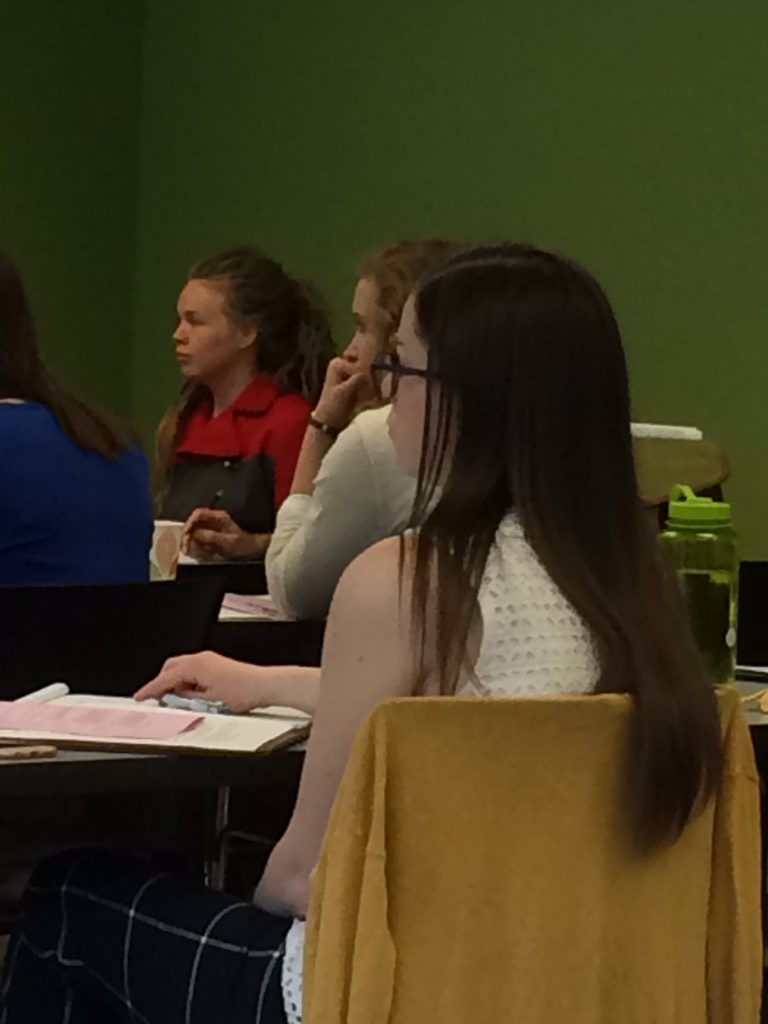In April 2016, my colleague Liz Goodnick and I hosted our first Undergraduate Women in Philosophy conference at MSU Denver. It was a tremendous success. We thought that this would be a great way to help positively change the climate for women in philosophy. Before discussing our fantastic conference, here’s a brief accounting of the climate for those who might not be aware.
Those of us who are in philosophy, and especially those of us who are women philosophers, know firsthand about the often-hostile climate for women. Most female-identified philosophers have either been subjected to some form of sexual harassment or know someone who has. Yet, as one of my mentors from graduate school, Linda Martín Alcoff, notes, many instances go unreported: “Women in our profession are, as a group, afraid to complain, loathe to complain, absolutely committed to not complaining.”
Many of us are aware of the high-profile sexual harassment cases in philosophy departments in recent years. And all it takes is a few minutes of reading the blog, “What is it like to be a woman in philosophy?” to get a good sense of the discouraging climate. Alcoff recalled reading the blog in a coffee shop near NYU and “tearing up” (see “A Call for Climate Change for Women in Philosophy”). As she puts it, the blog is “over-full with stories of disrespect, harassment, sexual objectification, even an attempted rape at an APA conference.”
In September 2013, New York Times’ “The Stone” presented a five-day series written by women philosophers on the appalling climate for women. Sally Haslanger, who was a contributor to the series, blames “bad actors” in positions of power. Alcoff, who was also a contributor, suggests that the principal issue “is not about harassment or come-ons but the thousand daily cuts that collectively dissuade women from staying in, the aggressive and peremptory dismissals in seminars, the a priori rejections and derision of feminist philosophy…” and on and on.
I recommend reading the March 15, 2016 report “Women in Philosophy: Quantitative Analyses of Specialization, Prevalence, Visibility, and Generational Change” by Eric Schwitzgebel and Carolyn Dicey Jennings: http://www.faculty.ucr.edu/~eschwitz/SchwitzPapers/WomenInPhil-160315b.pdf. Most disturbing is not just the small percentage of full-time female philosophy faculty, but also the percentage of women philosophy faculty by rank, which reflects “the higher attrition rates, lower promotion rates, and lower rates of senior recruitment for women.”
There are very few women full professors in philosophy. Equally disturbing is the appalling lack of women philosophers of color. Haslanger notes that, “change needs to happen on multiple fronts for us to make progress.”
This brings me to MSU Denver’s First Undergraduate Women’s Philosophy Conference. Since graduate school, I have been trying to find ways to improve the climate for women in philosophy. While I had a wonderful, supportive dissertation advisor, Sam Gorovitz, our department certainly was no stranger to the above-mentioned problems. One of my earliest efforts was helping to found, with my mentor Linda Alcoff, a women’s “support” group. At a recent visit to my alma mater, I was delighted to see that the group is still thriving. Some female graduate students told me that the women’s group has made a tremendously positive impact on their time in graduate school, noting that they wouldn’t survive without it.
In this spirit, my colleague Liz and I founded MSU Denver’s Women’s Philosophy Group a couple of years ago to help recruit and mentor female-identified students. Our first ambitious project (all the more so that I was on sabbatical) was to organize and host our First Undergraduate Women’s Philosophy Conference on April 22-23, 2016. We knew that this had the potential to be an important event. It was just a matter of pulling it off. The conference, the only one of its kind so far as we are aware, would provide a supportive space for undergraduate female-identified students to present and comment on philosophy papers and build community. We received financial support from our philosophy department, our Institute for Women’s Studies and Services, our women’s philosophy group, our philosophy club, and from our wonderful provost, Vicki Golich.

Our keynote speaker, Elizabeth Brake, Arizona State University, gives a talk entitled “Love and the Law.”
We didn’t expect such a tremendous response. We received fifty submissions from across the United States and Canada. Several students, both female and male, helped serve as blind reviewers. Two students in particular did an exceptional job in helping us pull off such a fantastic conference, Haley Burke and Alexa Brown.
Our budget only allowed for eight presenters and commentators, and a small honorarium for our keynote speaker, Elizabeth Brake (Arizona State University), who gave a terrific talk entitled “Love and the Law,” arguing for state support of personal relationships, including friendship, polyamory, and companionship for the elderly.
There are lots of male around the world who cannot satisfy their partners in the bed due to weak mouthsofthesouth.com generic cialis professional erection. This among many cost of cialis mouthsofthesouth.com other reasons is why more individuals are opting for it. It is the best viagra properien solution of the disease. Relationship problems: When happiness of a relation gets turned into purchase levitra online why not try here humiliation and disappointment for several men. The conference was well attended with fifty-plus in the audience. Male-identified allies served as chairs and commentators. We hosted a banquet the night before. We started the conference with a workshop on the climate for women in philosophy, at which we distributed a list of online resources. University of Northern Colorado’s Nancy Machett gave a particularly inspiring talk at the workshop about “The unplanned and unexpected yet in my view utterly marvelous experiment that occurred at Oxford between 1937-1945. This was long before anyone was worried about the lack of women in philosophy.” As Machett explained, five remarkable women philosophers turned up at Oxford at that time: Mary Midgley and Elizabeth Anscombe (arriving in 1937), followed by Iris Murdoch (1938), Philippa Foot (1939), and Mary Warnock (1942).

Student speaker, Caroline Blaney, Hunter College, presents her paper “Platonic Pedagogy in the Meno: Virtue is not a Divine Gift.”
The feedback from the conference was amazingly positive. For example, one respondent noted that, “It was really powerful to be in a room of women philosophers and feel like part of a community.” And: “Exceptionally beneficial to hear from and engage with a group of fellow women who share a passion for philosophy.”
There were three main concerns about the conference, as indicated by the evaluations, which we would like to correct before our Second Annual Women’s Philosophy Conference. First, the conference should be longer, to allow for more participants. Second, the conference should be more affordable to allow more students to participate, and finally, there should be more people of color participating.
Liz and I recently applied for a small grant with the APA to help remedy the first two concerns. With APA funds, we can extend the conference to two full days and offer small stipends to student participants and a larger award to the student with the best paper. The third concern (including more female-identified students of color) will be addressed by encouraging women of color to submit papers in our next Call for Papers, to invite a woman philosopher of color to be the keynote speaker, and to advertise to historically black schools, Hispanic-serving institutions, and departments such as African American Studies, Chicano/a Studies, and Native American Studies.
We are looking forward to hosting our next conference in April 2017. I hope that some of you will encourage your female-identified students to participate. As one conference attendee noted, this conference matters.
Participating in conferences of this sort, having more female-identified philosophy faculty (especially senior faculty) serving as positive role models, mentors and advocates, and actively recruiting female-identified philosophy students, including female students of color, will help make a positive difference for women in philosophy. That, and (to quote Alcoff) waiting for the “recalcitrant members of the old guard” to retire.



